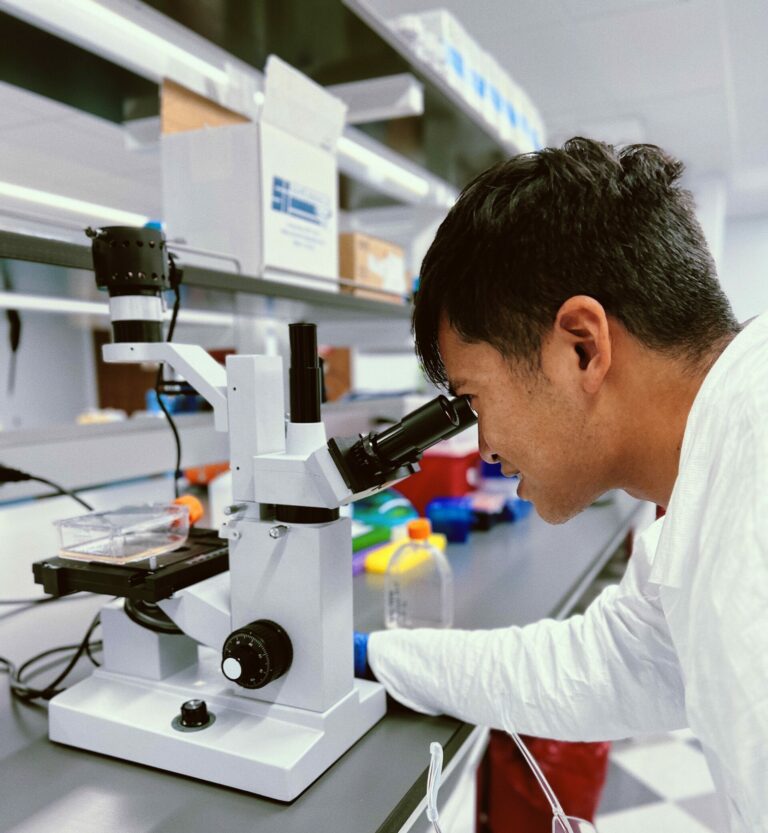A case of immune T cell identity theft (trogocytosis) gave German scientists the vital clue they needed to understand a key mechanism behind the development of multiple sclerosis (MS).
In a recently published paper, scientists at the Institute of Neuropathology in Gottingen, Germany, describe new research that could help doctors treat MS. [1] The key to their research proved to be a process called “trogocytosis”. This happens when a T cell engaged with an antigen-presenting cell essentially grabs surface molecules from the antigen-presenting cell and presents them on its own surface. MS is an inflammatory autoimmune disease, but unlike other autoimmune diseases, it is not associated with any of the typical disease-associated autoantibodies. Instead, MS is thought to be caused by the pathogenic interaction of T cells and B cells. Since previous research had shown that CD20-expressing T cells are present with elevated frequency under various autoimmune and inflammatory conditions (including MS), this T cell subtype was a prime suspect for further study. The German research group, therefore, set out to study the origin, phenotype, and function of CD20+ T cells in both mice and humans.
The researcher’s first step was to obtain two distinct autoimmune mouse models (EAE mice) that mimicked the pathology of MS in humans. In each model, CD20-expressing T cells are found in increasingly higher numbers in the lymph nodes as the disease progresses.
The scientists also obtained blood samples from volunteer MS patient donors to use as starting material for their human tissue studies.
In their first set of experiments, the researchers used flow cytometry data to demonstrate that mouse T cells do not naturally express CD20 and in fact, are only capable of expressing CD20 in the presence of antigen-presenting cells. Direct stimulation of T cells isolated from wild type mice failed to increase the frequency of CD20+ T cells. However, activation of T cells in the presence of antigen presenting cells resulted in a concentration-dependent proliferation and expansion of CD20+ T cells. This expanded population of CD20+ T cells secreted significantly more pro-inflammatory cytokines than CD20- T cells in the same culture.
Following these experiments, the researchers looked at cultures with and without B cells. Despite similar T cell activation and proliferation rates overall, the frequency of CD20+ T cells did not increase when B cells were absent. In co-culture studies, only those cultures containing CD20+ B cells were capable of generating CD20+ T cells. By using a Transwell co-culture system, the scientists were further able to show that direct contact between CD20+ B cells and naïve T cells was necessary to generate CD20+ T cells. They also showed that the expression of MHC class 2 molecules on B cells was required for the generation of CD20+ T cells. These molecules are normally found only on antigen-presenting cells and are part of the machinery needed to engage with T cells and initiate an immune response.
Confirming trogocytosis
These results strengthened the scientists’ theory that trogocytosis was at play. If they were correct, some T cells, when engaged with the MHC- 2 complex on CD20+ B cells, were inadvertently “grabbing” the nearby CD20 protein, then displaying it on their own surface. And if that turned out to be true, it potentially provided researchers with a new way to treat MS via immunotherapy.
To confirm the trogocytosis theory in vivo, the scientists used adoptive transfer to put B cells back into B cell deficient mice who had no natural CD20+ T cells. They confirmed that only those mice receiving CD20+ B cells were able to generate CD20+ T cells. Next, the researchers used the EAE mouse models to show that CD20+ T cell expansion was tightly associated with proinflammatory T cell activation. Moreover, adoptive transfer of CD20+ T cells significantly exacerbated clinical and histological symptoms of EAE disease.
For the final set of in vivo experiments, the researchers set out to determine whether treating EAE mice with anti-CD20 antibodies could ameliorate their disease. The researchers were thrilled to find that immunotherapy treatment with anti-CD20 antibodies resulted in virtually complete depletion of both CD20+ T cells and CD20+ B cells in vivo. While anti-CD20 treatment did not eliminate EAE disease, it did significantly reduce demyelination of nerve cells in the central nervous system, a significant therapeutic benefit.
With these promising results in hand, the German research group transferred their attention to the human MS patient samples. They found that while human blood does contain a small population of endogenous CD20+ T cells, these cells are only activated in the presence of antigen presenting B cells. Furthermore, blocking the MHC-2 complex on B cells strongly reduced generation of CD20+ T cells, suggesting trogocytic transfer was at work.
Analysis of peripheral blood mononuclear cells (PBMCs) from untreated patients with MS revealed that expression of CD20 on human T cells is strongly associated with enhanced activation of pro-inflammatory cytokines.
As part of their research, the authors had the unique opportunity to follow patients in their on-site clinic who were scheduled to receive anti-CD20 immunotherapy. Each patient was analyzed prior to receiving therapy, and at regular timepoints following therapy initiation. In all patients, anti-CD20 treatment thoroughly depleted both CD20+ B and T cells from the blood. In most patients, CD20+ B cells and T cells reappeared after cessation of the therapy, along with an enhanced frequency of pro-inflammatory cytokines.
Taken together, the findings in this paper strongly suggest that T cells acquire membrane bound CD20 via trogocytosis from CD20+ B cells during the immune activation process. These CD20+ T cells then proliferate as part of the normal immune cascade. This explains why T cell expression of CD20 is low in healthy individuals, but high in patients with autoimmune conditions. The studies in EAE mice also show that CD20+ T cells generated during immune activation show enhanced infiltration of central nervous system tissue compared to CD20- T cells, demonstrating that the CD20+ T cells have a pathogenic functional phenotype.
From an immunotherapy standpoint, the discovery of a pathogenic interaction between CD20+ B cells and T cells enhances our understanding of MS and other autoimmune diseases, and also provides important diagnostic and therapeutic opportunities.
To learn more about immunotherapy-related products and services, please contact us today.
Reference
- Ochs, J., Nissimov, N., Torke, S., Freier, M., Grondey, K., Koch, J., Klein, M., Feldmann, L., Gudd, C., Bopp, T., Häusser-Kinzel, S., & Weber, M. S. (2022). Proinflammatory CD20+ T cells contribute to CNS-directed autoimmunity. Science translational medicine, 14(638), eabi4632. https://doi.org/10.1126/scitranslmed.abi4632

